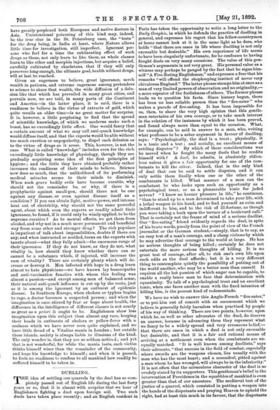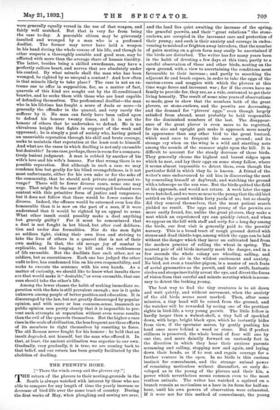DUELLING.
THE idea of settling our quarrels by the duel has so com- pletely passed out of English life during the last forty years or so, that it is almost with surprise that we hear of Englishmen fighting a duel upon foreign soil. Two such duels have taken place recently; and an English resident in Paris has taken the opportunity to write a long letter to the Daily Graphic, in which he defends the practice of duelling in general, and expresses his regret that his fellow-countrymen at home cannot look at it in the same light as he does, who holds "that there are cases in life where duelling is not only excusable but desirable." His own experience of life seems to have been singularly unfortunate, for he confesses to having fought duels on very many occasions. The value of this gen- tleman's arguments is not very great. His personal value as a witness may perhaps be gauged by the fact that he signs him- self "A Fire-Eating Englishman," and expresses a fear that his remarks "will offend the shopkeeping instinct of never very chivalrous England." The latter phrase stamps him at once as a man of very limited powers of observation and no originality,— a mere repeater of the foolishness of others. The former phrase leads us to question his facts. Since history began, there has been no less reliable person than the " fire-eater " who makes a parade of fire-eating. It has been impossible for us, then, to share the very high opinion that this gentle- man entertains of his own courage, or to take much interest in the relation of the instances by which it has been proved, and found always more than equal to the occasion. What, for example, can be said in answer to a man, who, writing what professes to be a sober argument in favour of duelling, says : "Psychologically, the duel is a treat ; physically, it is a tonic and a test ; and socially, an excellent means of settling disputes"? By which of these considerations was he moved when he fought the many duels that he credits himself with P A duel, he admits, is absolutely ridicu- lous unless it gives a fair opportunity for one of the com- batants to kill the other. Indeed, that is the only kind of duel that can be said to settle disputes, and it can only settle them finally when one or the other of the combatants is killed. What manner of a man can the combatant be who looks upon such an opportunity as a psychological treat, or as a pleasurable tonic for jaded nerves P "I know no keener pleasure in life," he continues, "than to stand up to a man determined to take your life, with a lethal weapon in his hand, and to find yourself as calm and indifferent to him, and to the risk of ill-fortune, as though you were taking a bock upon the terrace of a boulevard café." That is certainly not the frame of mind of a serious duellist. Our " fire-eating " friend evidently regards the duel, in spite of his brave words, purely from the point of view of the French journalist or the German student—simply, that is to say, as an easy test of a man's courage, and a cheap reclame by which he may advertise that courage to the world at large. He has no serious thoughts of being killed ; certainly he does not entertain the more serious thoughts of killing. It is no great test of courage, after all, to risk one's own life upon such odds as the duel affords ; but it is a very different thing to contemplate quietly the possibility of putting out of the world another, who may be a better man than oneself. It requires all the hot passion of which anger can be capable, to enable a really brave man to face that determination with equanimity. To talk of a psychological treat and an excellent tonic, when one faces another man with the fixed intention of killing him, is the poorest kind of rodomontade.
We have no wish to answer this Anglo-French "fire-eater," or to put him out of conceit with an amusement which we believe is generally fairly harmless when practised by people of his way of thinking. There are two points, however, upon which he, as well as other advocates of the duel, do deserve an answer, because in advancing them they represent what we fancy to be a widely spread and very erroneous belief,— that there are cases in which a duel is not only excusable but desirable, and that it is a fair and rational means of arriving at a settlement even when the combatants are un- equally matched. "It is well known among duellists," says their advocate, "that success in the field of combat, especially where swords are the weapons chosen, lies usually with the man who has the most heart; and a scoundrel, pitted against a man whom he has wronged, will always be in the inferiority." It is not often that the miraculous character of the duel is so crudely stated by its supporters. This gentleman's belief in the intervention of Providence in the squabbles of mankind is even greater than that of our ancestors. The mediceval test of the justice of a quarrel, which consisted in putting a weapon into the hands of the disputants and praying Heaven to uphold the right, had at least this much in its favour, that the disputants
were generally equally versed in the use of that weapon, and fairly well matched. But that is very far from being the case to-day. A peaceable citizen may be grievously insulted and wronged by a man who is a professed duellist. The former may never have held a weapon in his hand during the whole comae of his life, and though in other respects a thoroughly amiable and good man, may be afflicted with more than the average share of human timidity. The latter, besides being a skilled swordsman, may have a perfectly callous heart, and nerves that are absolutely under his control. By what miracle shall the man who has been wronged, be righted by so unequal a contest ? And how often is that miracle likely to take place ? The case is not an ex- treme one to offer in supposition, for, as a matter of fact, quarrels of this kind are sought out by the ill-conditioned brawler, and he seeks them with those who are least capable of defending themselves. The professional duellist—the man who in his lifetime has fought a score of duels or more—is generally the offender in the quarrel, and very rarely the sufferer by it. No man can fairly have been called upon to defend his honour twenty times, and it is not the honour of others that he undertakes to defend. He is no chivalrous knight that fights in support of the weak and oppressed ; he is simply a pest of society who, having gained an unenviable reputation through his skill and brute courage, seeks to maintain that reputation at the least cost to himself. And what are the cases in which duelling is not only excusable but desirable P In one case, perhaps, there is room for a compara- tively lenient judgment. A man is robbed by another of his wife's love and his wife's honour. For that wrong there is no possible reparation. But although in such a case we may condemn him but gently for his blind revengefulness, is it not most unfortunate, either for his own sake or for the sake of the community, that he should seek private and personal re- venge ? There will be fewer divorce cases, some one may urge. That might be the case if every outraged husband were content with this primitive form of justice and vengeance ; but it does not follow that there would be fewer causes for divorce. Indeed, the offence would be esteemed even less dis- honourable than it is now on the part of a man, if it were understood that it would be righted by an appeal to arms. What other insult could possibly make a duel anything but gravely guilty ? For it must be remembered that a duel is not fought in hot blood, but after cool delibera- tion and under due formalities. Nor do the men fight as soldiers fight, risking their own lives and striving to take the lives of others in a quarrel that is not of their own making. In that, the old savage joy of combat is explicable, and the longing to kill and the recklessness of life excusable. But the duellists face each other, not as soldiers, but as executioners. Each one has judged the other unfit to live, has condemned him on his own responsibility, and seeks to execute the sentence with his own hands. As a matter of curiosity, we should like to know what insults there are that would make it" desirable," or even excusable, that one man should take the other's life.
Among the lower classes the habit of seeking immediate re- paration with the fists is still prevalent enough ; nor is it quite unknown among people of better position and education. It is discouraged by the law, but not greatly discouraged by popular opinion, and with more or less common-sense, inasmuch as public opinion sees pretty clearly that it is impossible to pre- vent such attempts at reparation without even worse results than the evil of the quarrels themselves. But the higher a race rises in the scale of civilisation, the less frequent are these efforts of its members to right themselves by resorting to force. The old Roman never fought for his honour : he held that an insult degraded, not himself, but the man who offered it. In that, at least, the ancient civilisation was superior to our own. Gradually, very gradually, it is true, we are coming back to that belief, and our return has been greatly facilitated by the abolition of duelling.



































 Previous page
Previous page